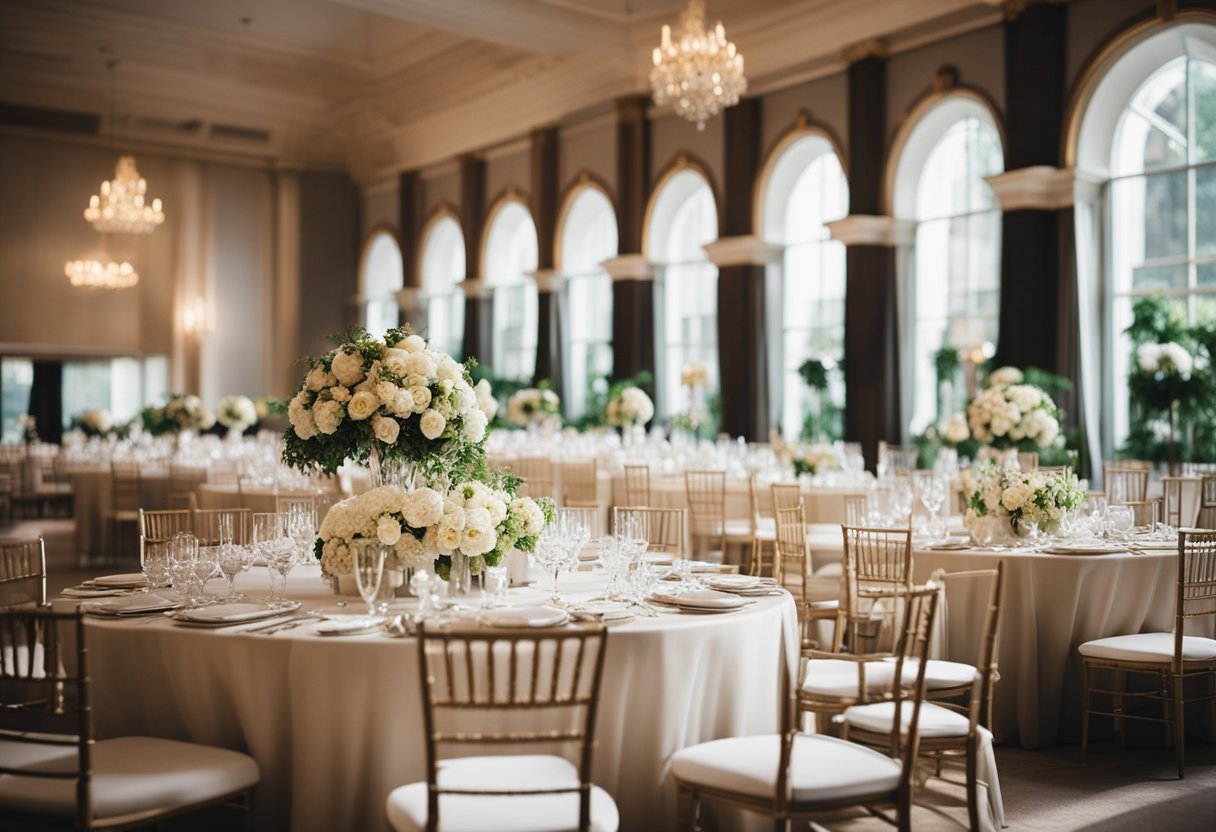Hidden Wedding Costs: How to Budget and Avoid Surprises
Wedding planning can be an exciting time for couples, but it can also be overwhelming, especially when it comes to budgeting. Many couples find themselves surprised by hidden wedding costs that vendors don’t always disclose upfront. These unexpected expenses can quickly add up and blow the budget.

From hidden vendor fees to unexpected decor expenses, there are many costs that couples may not consider when budgeting for their big day. For example, some vendors may charge extra fees for setup or breakdown, or for using specific equipment or materials. Additionally, couples may not factor in the cost of transportation for vendors or the cost of tips for service providers.
To avoid these hidden wedding costs, it’s important for couples to do their research and ask vendors detailed questions about their fees and services. Creating a detailed wedding budget and sticking to it can also help couples avoid overspending. By being proactive and informed, couples can plan a beautiful wedding without breaking the bank.
Understanding Wedding Budget Basics

Planning a wedding can be an exciting and overwhelming experience. One of the most crucial aspects of planning a wedding is setting a budget. Couples need to understand the basics of wedding budgeting to ensure that they stay within their financial means. Here are some essential things to know about wedding budgeting.
Setting Your Initial Budget
The first step in wedding budgeting is setting an initial budget. Couples need to determine how much they can afford to spend on their wedding. It is important to be realistic and consider all the expenses associated with a wedding. It is advisable to sit down and make a list of all the expenses, including the hidden costs, that are likely to be incurred.
Allocating Funds to Different Categories
Once the initial budget has been set, the next step is to allocate funds to different categories. Couples need to decide how much they want to spend on each aspect of the wedding, such as the venue, catering, photography, and entertainment. It is important to prioritize the expenses and allocate more funds to the crucial aspects of the wedding.
To make the budgeting process easier, couples can use a wedding budget planner or spreadsheet. These tools can help them keep track of their expenses and ensure that they stay within their budget.
Remember, hidden wedding costs can quickly add up and blow your budget out of the water. It is essential to be aware of these costs and factor them into your budget. Hidden costs may include taxes, gratuities, vendor fees, and other miscellaneous expenses.
In conclusion, understanding the basics of wedding budgeting is crucial for couples planning their wedding. By setting an initial budget and allocating funds to different categories, couples can ensure that they stay within their financial means and avoid any hidden costs.
Identifying Common Hidden Costs

Planning a wedding can be an exciting and overwhelming experience, but it’s important to keep in mind that there are often hidden costs that vendors may not disclose upfront. Here are some common hidden costs to be aware of and tips on how to budget for them.
Service Fees and Gratuities
It’s important to read the fine print when booking vendors for your wedding. Many vendors, such as caterers, photographers, and DJs, may charge a service fee on top of their base price. Additionally, some vendors may expect a gratuity for their services. Be sure to ask upfront about any additional fees or gratuities, and factor them into your overall budget.
Postage and Printing for Invitations
While invitations may seem like a small expense, postage and printing costs can quickly add up. Custom or oversized invitations may require extra postage, and printing costs can vary depending on the design and paper quality. It’s important to factor in these costs when budgeting for invitations.
Alterations and Attire Extras
Wedding dresses and suits often require alterations to ensure a perfect fit. Alteration costs can vary depending on the complexity of the alterations and the materials used. Additionally, accessories such as shoes, jewelry, and undergarments can also add up. Be sure to budget for these expenses when planning your wedding attire.
By being aware of these common hidden costs and factoring them into your budget, you can avoid any unexpected expenses and enjoy your special day without any financial stress.
Venue and Catering Surprises

Planning a wedding can be a daunting task, especially when it comes to budgeting. Hidden costs can quickly add up, leaving couples scrambling to find ways to cut back. One area where unexpected expenses can arise is with the wedding venue and catering. Here are some common surprises to watch out for and tips on how to budget accordingly.
Corkage and Cake Cutting Fees
Many venues charge a corkage fee if you choose to bring in your own alcohol. This fee can range from $10 to $30 per bottle and can quickly add up, especially if you have a large guest list. Additionally, some venues charge a cake cutting fee, which can be as much as $5 per slice. Be sure to ask about these fees upfront and factor them into your budget.

Vendor Meals and Overtime Charges
It’s important to remember that your vendors, such as the DJ, photographer, and wedding planner, will need to eat during the reception. Some venues charge a vendor meal fee, which can be as much as $50 per person. Additionally, if your reception goes longer than planned, you may be hit with overtime charges. These charges can be as much as $500 per hour for some vendors. Be sure to ask about these fees upfront and plan accordingly.
When it comes to hidden wedding costs, venue and catering surprises can be some of the most expensive. By asking about corkage and cake cutting fees, vendor meals, and overtime charges upfront, couples can better budget for their big day.
Additional Vendor Costs to Consider

When planning a wedding, it’s important to remember that the initial vendor quote may not be the final cost. There are often hidden fees and extras that can add up quickly and blow your budget. Here are some additional vendor costs to consider when budgeting for your wedding day.
Photography and Videography Extras
Photographers and videographers may offer additional services that are not included in their base package. These extras can include things like engagement photo sessions, additional hours of coverage, and photo albums or prints. It’s important to ask about these extras upfront and get a clear understanding of the costs involved.
Another potential cost to consider is the photographer or videographer’s travel fees. If your wedding is outside of their usual service area, they may charge an additional fee for travel and accommodations.
Music and Entertainment Incidentals
If you’re hiring a DJ or live musicians for your wedding, there may be additional costs to consider. For example, if you want your DJ to provide lighting or special effects, there may be an extra fee for that. Similarly, live musicians may charge extra for things like additional rehearsal time or special song requests.
It’s also important to remember that there may be overtime fees if you want your entertainment to play for longer than the agreed-upon time. Make sure to discuss this with your vendor ahead of time so you can budget accordingly.
Overall, it’s important to read contracts carefully and ask vendors about any potential hidden costs or fees. By doing so, you can avoid any unpleasant surprises and stay within your budget on your wedding day.
Logistics and Last-Minute Details

Planning a wedding involves more than just choosing the perfect dress and venue. There are many hidden costs that vendors may not tell you about, and it’s important to budget accordingly. One area that can easily be overlooked is logistics and last-minute details. Here are some things to keep in mind:
Transportation and Accommodation
Transportation and accommodation are two important factors to consider when planning a wedding. If you have guests coming from out of town, they may need a place to stay and transportation to and from the wedding venue. This can add up quickly, especially if you are providing transportation for a large group.
Consider negotiating group rates with hotels and transportation companies to save money. You can also provide guests with a list of recommended accommodations and transportation options, so they can make their own arrangements.
Weather-Related and Emergency Expenses
Weather-related and emergency expenses are another area that can easily be overlooked. If you are having an outdoor wedding, you may need to rent a tent or other equipment in case of rain. You may also need to budget for emergency expenses, such as last-minute vendor cancellations or unexpected repairs.
To prepare for these expenses, it’s a good idea to set aside a portion of your budget for emergencies. You can also work with your vendors to ensure that they have backup plans in place in case of emergencies.
Overall, logistics and last-minute details are an important part of wedding planning that should not be overlooked. By budgeting for transportation, accommodation, weather-related, and emergency expenses, you can ensure that your big day goes off without a hitch.
Contracts and Insurance
 Reading the Fine Print
Reading the Fine Print
When it comes to wedding planning, contracts are a necessary evil. They ensure that both parties are on the same page and that everyone knows what is expected of them. However, it’s important to read the fine print carefully to avoid any hidden costs. Make sure you understand all the terms and conditions before signing on the dotted line.
Some things to look out for include cancellation policies, overtime fees, and additional charges for things like equipment rentals or extra staff. Make sure you know what is included in the package and what is not. If there is anything that you are unsure about, don’t be afraid to ask questions. It’s better to be safe than sorry.
Investing in Wedding Insurance
Wedding insurance is a type of insurance that covers unexpected events that may occur during your wedding. It can protect you from things like vendor cancellations, severe weather, and even lost or stolen items. While it may seem like an unnecessary expense, it can actually save you a lot of money in the long run.
Before purchasing wedding insurance, make sure you understand what is covered and what is not. Policies can vary widely, so it’s important to read the fine print carefully. Some policies may not cover things like pre-existing conditions or acts of terrorism. Make sure you choose a policy that meets your specific needs and budget.
Investing in wedding insurance can give you peace of mind and protect you from hidden wedding costs. It’s a small price to pay for the assurance that your special day will go off without a hitch.
Remember to also budget for other hidden wedding costs such as the marriage license fee and any additional fees that may arise during the planning process. By being aware of these costs and taking steps to mitigate them, you can ensure that your wedding day is everything you’ve dreamed of and more.
Finalizing Your Wedding Budget

After creating a wedding budget, it’s important to finalize it to ensure that it’s realistic and that all expenses are accounted for. This section will provide tips on how to finalize your budget and avoid hidden wedding costs.
Reviewing Expenses and Hidden Fees
Before finalizing your budget, review all expenses and ensure that they are accurate. Hidden fees can add up quickly and can easily exceed your budget. Some common hidden fees to watch out for include sales tax, service charges, and tips.
It’s also important to account for unexpected guests. It’s common for guests to bring a plus one or for last-minute guests to show up. To avoid unexpected costs, it’s recommended to add a buffer to your budget for unexpected guests.
Creating a Buffer for Unexpected Costs
Creating a buffer for unexpected costs is crucial to avoid going over your budget. It’s recommended to set aside at least 10% of your budget for unexpected costs. This emergency fund will help cover any unexpected expenses that may arise during the wedding planning process.
In conclusion, finalizing your wedding budget is essential to ensure that all expenses are accounted for and to avoid hidden wedding costs. By reviewing expenses and creating a buffer for unexpected costs, you can ensure that your budget is realistic and that you won’t be hit with any unexpected expenses.



